2024届高三英语二轮复习介词课件(共43张PPT)
文档属性
| 名称 | 2024届高三英语二轮复习介词课件(共43张PPT) |  | |
| 格式 | pptx | ||
| 文件大小 | 7.1MB | ||
| 资源类型 | 教案 | ||
| 版本资源 | 通用版 | ||
| 科目 | 英语 | ||
| 更新时间 | 2024-03-27 20:13:36 | ||
图片预览

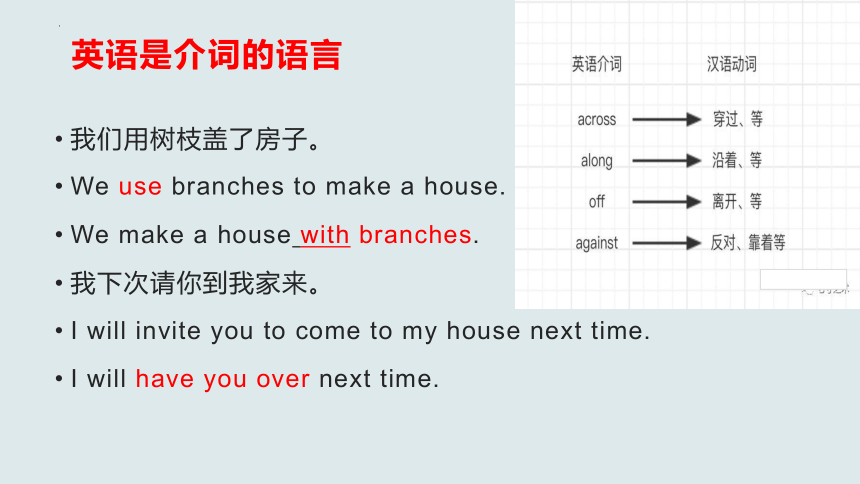
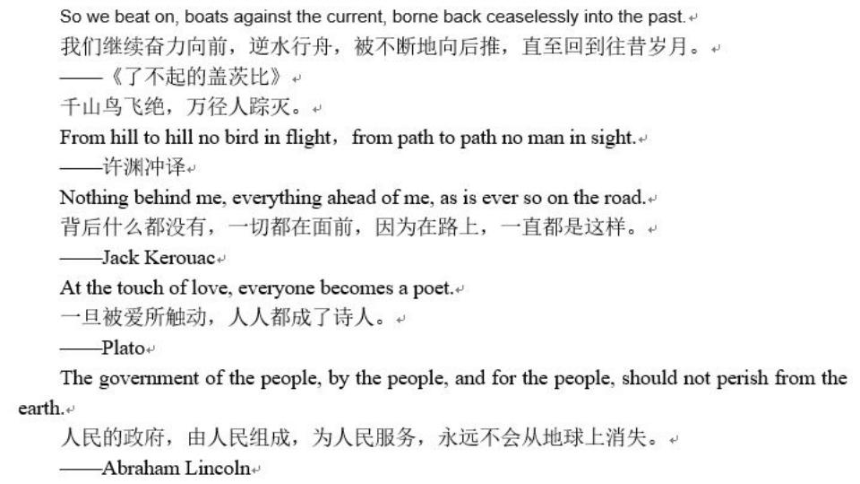
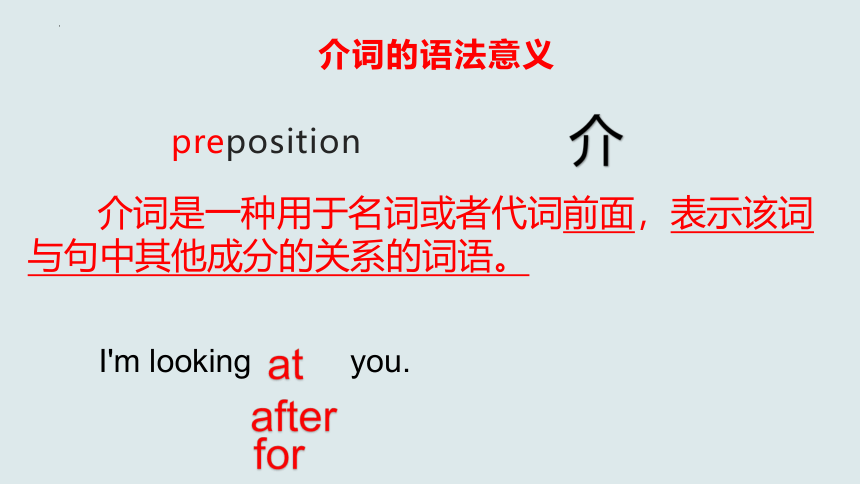
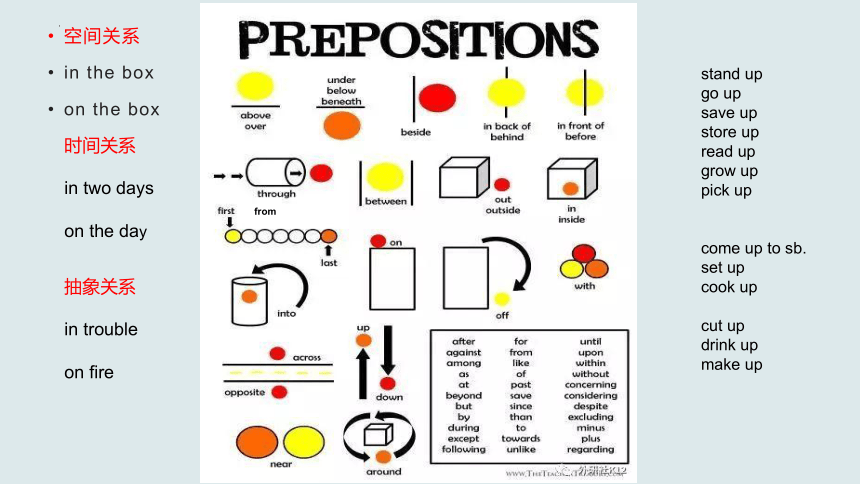
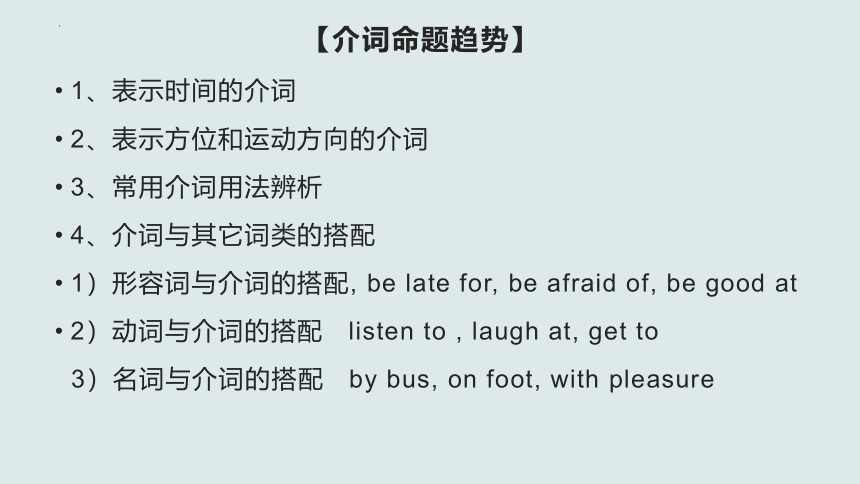
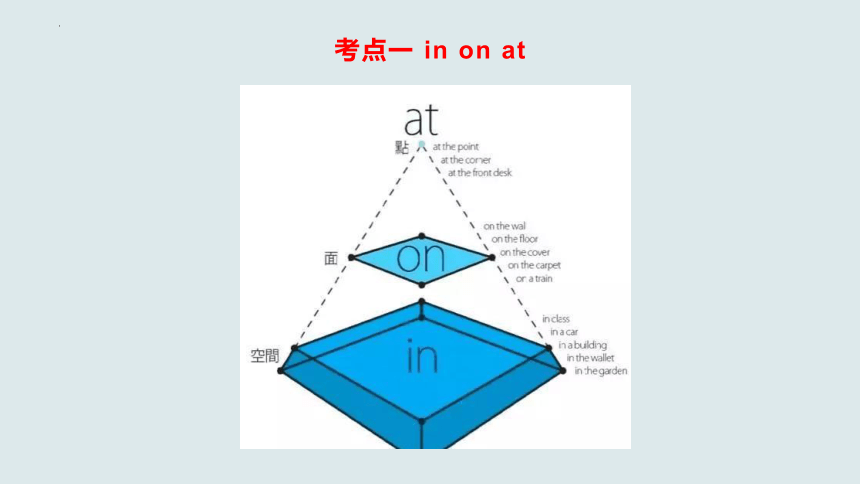
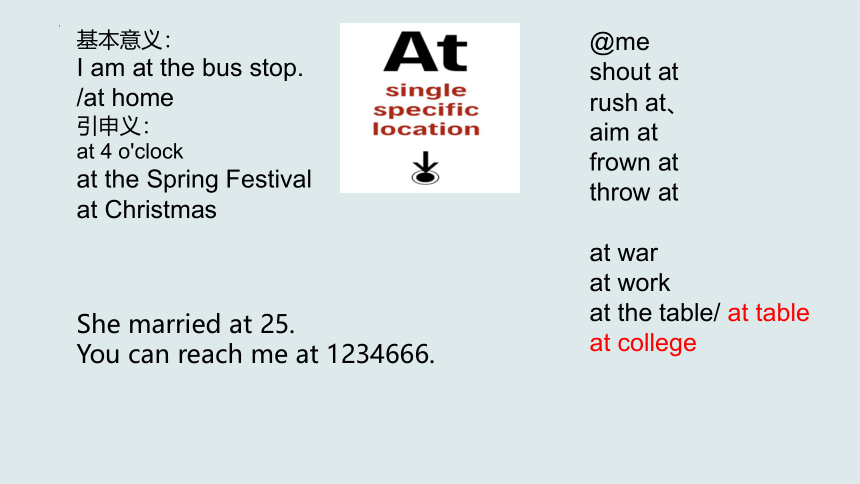
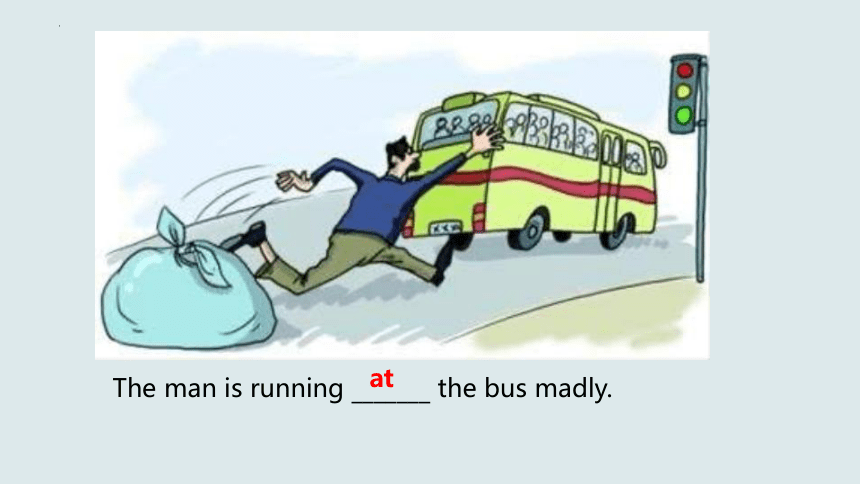
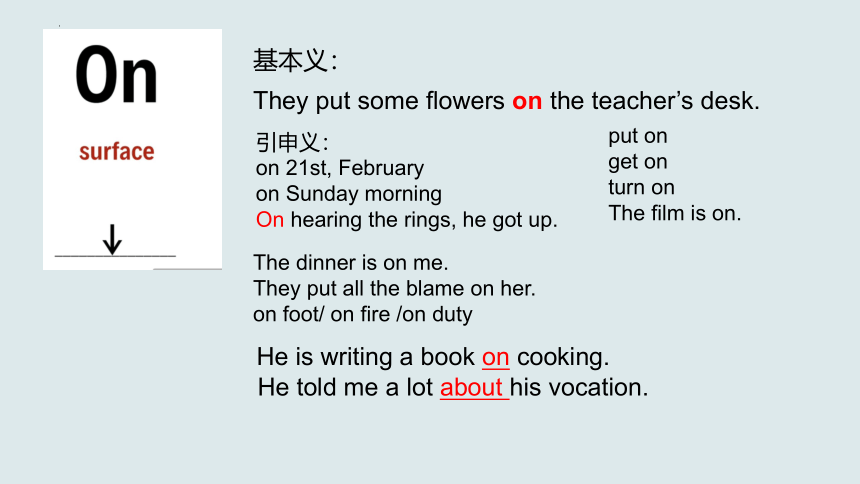
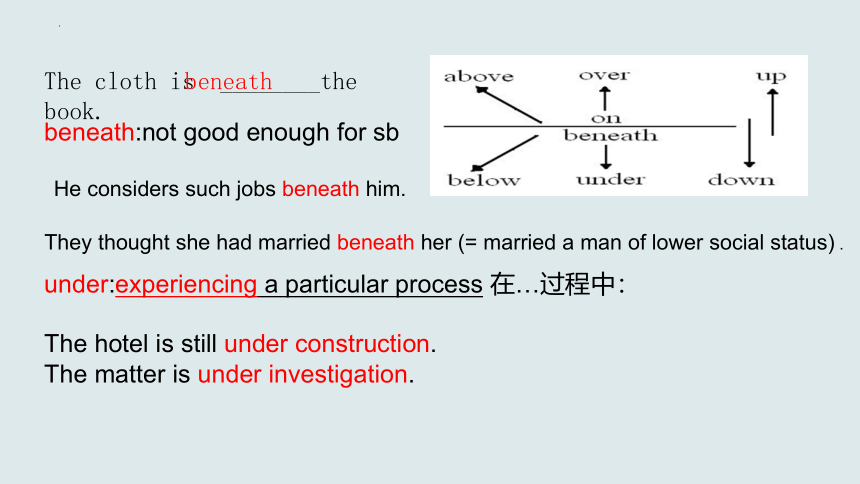

文档简介
(共43张PPT)
小介词 大学问
英语是介词的语言
我们用树枝盖了房子。
We use branches to make a house.
We make a house with branches.
我下次请你到我家来。
I will invite you to come to my house next time.
I will have you over next time.
介词的语法意义
preposition
介
I'm looking you.
at
介词是一种用于名词或者代词前面,表示该词与句中其他成分的关系的词语。
after
for
空间关系
in the box
on the box
时间关系
in two days
on the day
抽象关系
in trouble
on fire
stand up
go up
save up
store up
read up
grow up
pick up
come up to sb.
set up
cook up
cut up
drink up
make up
from
【介词命题趋势】
1、表示时间的介词
2、表示方位和运动方向的介词
3、常用介词用法辨析
4、介词与其它词类的搭配
1)形容词与介词的搭配, be late for, be afraid of, be good at
2)动词与介词的搭配 listen to , laugh at, get to
3)名词与介词的搭配 by bus, on foot, with pleasure
考点一 in on at
@me
shout at
rush at、
aim at
frown at
throw at
at war
at work
at the table/ at table
at college
基本意义:
I am at the bus stop. /at home
引申义:
at 4 o'clock
at the Spring Festival
at Christmas
She married at 25.
You can reach me at 1234666.
The man is running _______ the bus madly.
at
基本义:
They put some flowers on the teacher’s desk.
引申义:
on 21st, February
on Sunday morning
On hearing the rings, he got up.
The dinner is on me.
They put all the blame on her.
on foot/ on fire /on duty
He is writing a book on cooking.
He told me a lot about his vocation.
put on
get on
turn on
The film is on.
The cloth is ________the book.
beneath
They thought she had married beneath her (= married a man of lower social status) .
He considers such jobs beneath him.
under:experiencing a particular process 在…过程中:
The hotel is still under construction.
The matter is under investigation.
beneath:not good enough for sb
There is a bridge over the river.
We flew above the clouds.
He was a good student and scored ____average in most subjects.
A.below B. of C.on D. above
What is in the newspaper/photo/picture
The chair is in the way .
基本义:
I prefer to stay in my own room.
引申义:
in /during the twentieth century
in 2020
in March
in a week
on用于表示动态,正在从事某种活动或处于某种运动状态之中。on business,on a visit ,;on strike,;
on sale,;on show,;on watch,;on fire;
on vacation/holiday
in多用于表示静态状况,如安全、危险、健康,涉及人的情绪等。如:in trouble
;in danger;in order;in surprise;in silence;in high/low spirits
in or on
Practice level one
1. The patient's life is danger.
2. The guard is watch now.
3. The house is fire.
4. Mary was _______ the supermarket.
in
on
on
in/at
They jumped in the train.
They jumped into the train.
in vs into
静和动
in vs into
2. We got in France after some delay.
We got into France after some delay.
We drove to France.
3. look into my eyes / look into the case
a frog changing ___________ a handsome prince.
a car _________ good (or bad) shape/condition.
into
in
out: away from an enclosure
help...out spread out out of curiosity think ...out
put out die out
off: away from a surface ( 偏 离 断 )
off the course / see...off / cut...off/
off sale /on sale/for sale kick off put off
He drove off. Take off your shirt.
off the topic
After spotting a wallet on the front seat inside a parked car with its window down, he stood guard in the rain for about two hours waiting for the owner to return.
...After hours in the cold and wet, he reached inside and pulled the wallet out hoping to find some ID so he could contact(联系)the driver, ...
考点复现:
考点复现
So far, several ships have been reported missing ___________ the coast of Bermuda Island.
2. The boxers were dragged _________ each other at the final bell.
off
off
1. Japan is/liest the east of China.
2. Beijing lies ____the north of China.
3. Mongolia is/lies __ the north of China.
to
in
on
The Student Union is going to hold a party
in the meeting room of the main building
on Saturday evening, August15.
Important Notes
六个: this, that, last, next, some, every,
三天:tomorrow, yesterday, today
一晚:tonight 等词之前一律不用介词
1.We meet every day.
2.We are to meet some day.
3.Where did you go last weekend
1.I repeated the procedure next day.
2.Where are you going next week
the next day 用于过去时。
practice level two
1. —Good morning, Mr. Lee’s office.
—Good morning. I’d like to make an appointment next
Wednesday afternoon.
A. for B. on C. in D. at
2. He was caught _______ the rain.
My school is ______ 376 Wuxing Road, and my class is _____ the third floor.
A
at
on
in
The party was scheduled for 7:00.
考点二:表持续时间的since, for, in, after,from的区别
1 --- How long has the bookshop been in business
--- _____ 1987.
A. After B. In C. From D. Since
2 The touch they had both kept in ____ many years broke.
A. for B. on C. into D. with
Important Notes
★ for 接一段具体的时间, 常用于完成时, 但不是一定要用于完成时。
Mr.Brown enjoyed the country life and lived there for almost fifteen years after his retirement.
He has been to Beijing three times. (不可用for three times)
1 His father will be back from London ____ a few days.
A. since B. in C. on D. after
2. He arrived after five months.
3. She will appear after five o’clock this afternoon.
★“in +段时间”表示将来的一段时间以后;
“after+段时间”表示过去的一段时间以后;
“after+将来点时间”表示将来的某一时刻以后。
★from接时间点的名词词组,表示行为或状态的起始点,而不涉及其持续时间的长短
My younger sister began to learn dancing from the age of five.
She was blind from birth.
from then on
引申义:She saved him from drawing.
Far from __charging__ consumers high price, many of their sevices are free.
At the end of last year, his family moved to their new house.
You can find the graden at the end of this road.
We had learned 6 sections of the grammar by the end of yesterday.
In the end I could not bear it any more.
Now that you have started, you'd better go on with the work to the end.
考点三: by,in,on表示旅行方式
(1)不涉及交通工具的名词 by sea,by water,by land,by air
(2)涉及交通工具的名词
by bike,by taxi ,by plane,by ship/boat ,by train, by spaceship
(3)当旅行方式涉及确定特指的交通工具时,用on或in
travel to New York in this plane,leave on an early train,go to school on my bike等。
说明:步行、骑马、骑骆驼均用on。
如:on foot,on horseback/on a horse,on the camel。
【题组训练】句型转换(每空一词):
He went to Beijing _______ car.
He went to Beijing _______ his/a car. .
by
in
考点四 at for by 表示价格,比率,标准,速度
★ at 表示价值,价格, 比率或速度, 表单价.
★ for 表示交换, 指总价钱 exchange for ,be punished for violent behaviour
★ by 表示度量单位或标准. 后接表计量单位的名词一般是单数,前面需加定冠词the. 数词或复数名词前不加.
We are flying _______ a speed of 400kms/hr.
I bought these books ______ 5 dollars each.
He is paid _______ the week. He is paid by time.
at
by
at
考点五 with,by,in表方式
三个词均意为“用”,表示行为的工具、手段或方式。
This form is to be filled in ink.
This toy is not machine-made.lt is made by hand.
In the morning I usually listen to the news over/on the radio.
They are digging with a pick/spade.
(1) with用于有形的工具或某些身体器官之前,其后的名词多被冠词、物主代词等修饰。
We see with our eyes,hear with our ears, and walk with our legs.
(2) by,in,on,over,through等多用于无形的工具或方式手段之前。
by hand,in ink,on the telephone,over/on the radio,through the telescope等。
(3)in ①使用语言、原料、材料时用in表示,如:in English/Japanese;in blue ink ②表达“用……方法/方式”时,所用介词分别为: in this/that/the same way by means of by this/that means
by
(1). They decided to travel by night.
(2) He seized me by the arm.
(3)“由于……的结果;凭借……”
He succeeded by hard work.
(4)以……的幅度
We lost the match by one goal.
(5)“按照……”、“根据……”
By my watch,the time is half past eleven.
By the expression on his face,he seemed to be displeased.
We shall get a storm before long by the look of the sky.
考点六 among between
12 He divided the sweets _____ the children who were divided ___ three groups.
A. in; in B. into; into C. between; in D. among; into
★between :considers individuals
The teacher sat between Tom, Jack, Kate, Jane and Mary.
You’d better eat nothing between meals.
among: considers collective
The teacher sat among the students.
考点七: as VS like
Bamboo leaves swing in the wind like slim fingers reaching to touch something.
The cat humped its back just like a fierce tiger to jump upon me.
Do as the Romans do when in Rome
常见介词使用问题
1.遗漏/添加介词
We knocked the door but there was no one there.
They would inform him any progress they had made.
Most people marry with a person they love.
As I approached to the house, I noticed a light on upstairs.
常见介词使用问题
2.搭配错误
Recycling is a good way to manage waste despite of its cost.
In accordance to your request, I am sending a copy of my book.
The second hotel was far superior than the first one.
with
to
常见介词使用问题
3. 吊尾介词
(1). The girl is easy to get along with.
(2). There is nothing for us to worry about.
(3). He is the very man I just spoke to.
This is the life he is used to.
(2)The problem is worth dealing with.
The book is worthy of being referred to.
(3). He has never been spoken to in this way.
Time should be made good use of.
(
小介词 大学问
英语是介词的语言
我们用树枝盖了房子。
We use branches to make a house.
We make a house with branches.
我下次请你到我家来。
I will invite you to come to my house next time.
I will have you over next time.
介词的语法意义
preposition
介
I'm looking you.
at
介词是一种用于名词或者代词前面,表示该词与句中其他成分的关系的词语。
after
for
空间关系
in the box
on the box
时间关系
in two days
on the day
抽象关系
in trouble
on fire
stand up
go up
save up
store up
read up
grow up
pick up
come up to sb.
set up
cook up
cut up
drink up
make up
from
【介词命题趋势】
1、表示时间的介词
2、表示方位和运动方向的介词
3、常用介词用法辨析
4、介词与其它词类的搭配
1)形容词与介词的搭配, be late for, be afraid of, be good at
2)动词与介词的搭配 listen to , laugh at, get to
3)名词与介词的搭配 by bus, on foot, with pleasure
考点一 in on at
@me
shout at
rush at、
aim at
frown at
throw at
at war
at work
at the table/ at table
at college
基本意义:
I am at the bus stop. /at home
引申义:
at 4 o'clock
at the Spring Festival
at Christmas
She married at 25.
You can reach me at 1234666.
The man is running _______ the bus madly.
at
基本义:
They put some flowers on the teacher’s desk.
引申义:
on 21st, February
on Sunday morning
On hearing the rings, he got up.
The dinner is on me.
They put all the blame on her.
on foot/ on fire /on duty
He is writing a book on cooking.
He told me a lot about his vocation.
put on
get on
turn on
The film is on.
The cloth is ________the book.
beneath
They thought she had married beneath her (= married a man of lower social status) .
He considers such jobs beneath him.
under:experiencing a particular process 在…过程中:
The hotel is still under construction.
The matter is under investigation.
beneath:not good enough for sb
There is a bridge over the river.
We flew above the clouds.
He was a good student and scored ____average in most subjects.
A.below B. of C.on D. above
What is in the newspaper/photo/picture
The chair is in the way .
基本义:
I prefer to stay in my own room.
引申义:
in /during the twentieth century
in 2020
in March
in a week
on用于表示动态,正在从事某种活动或处于某种运动状态之中。on business,on a visit ,;on strike,;
on sale,;on show,;on watch,;on fire;
on vacation/holiday
in多用于表示静态状况,如安全、危险、健康,涉及人的情绪等。如:in trouble
;in danger;in order;in surprise;in silence;in high/low spirits
in or on
Practice level one
1. The patient's life is danger.
2. The guard is watch now.
3. The house is fire.
4. Mary was _______ the supermarket.
in
on
on
in/at
They jumped in the train.
They jumped into the train.
in vs into
静和动
in vs into
2. We got in France after some delay.
We got into France after some delay.
We drove to France.
3. look into my eyes / look into the case
a frog changing ___________ a handsome prince.
a car _________ good (or bad) shape/condition.
into
in
out: away from an enclosure
help...out spread out out of curiosity think ...out
put out die out
off: away from a surface ( 偏 离 断 )
off the course / see...off / cut...off/
off sale /on sale/for sale kick off put off
He drove off. Take off your shirt.
off the topic
After spotting a wallet on the front seat inside a parked car with its window down, he stood guard in the rain for about two hours waiting for the owner to return.
...After hours in the cold and wet, he reached inside and pulled the wallet out hoping to find some ID so he could contact(联系)the driver, ...
考点复现:
考点复现
So far, several ships have been reported missing ___________ the coast of Bermuda Island.
2. The boxers were dragged _________ each other at the final bell.
off
off
1. Japan is/liest the east of China.
2. Beijing lies ____the north of China.
3. Mongolia is/lies __ the north of China.
to
in
on
The Student Union is going to hold a party
in the meeting room of the main building
on Saturday evening, August15.
Important Notes
六个: this, that, last, next, some, every,
三天:tomorrow, yesterday, today
一晚:tonight 等词之前一律不用介词
1.We meet every day.
2.We are to meet some day.
3.Where did you go last weekend
1.I repeated the procedure next day.
2.Where are you going next week
the next day 用于过去时。
practice level two
1. —Good morning, Mr. Lee’s office.
—Good morning. I’d like to make an appointment next
Wednesday afternoon.
A. for B. on C. in D. at
2. He was caught _______ the rain.
My school is ______ 376 Wuxing Road, and my class is _____ the third floor.
A
at
on
in
The party was scheduled for 7:00.
考点二:表持续时间的since, for, in, after,from的区别
1 --- How long has the bookshop been in business
--- _____ 1987.
A. After B. In C. From D. Since
2 The touch they had both kept in ____ many years broke.
A. for B. on C. into D. with
Important Notes
★ for 接一段具体的时间, 常用于完成时, 但不是一定要用于完成时。
Mr.Brown enjoyed the country life and lived there for almost fifteen years after his retirement.
He has been to Beijing three times. (不可用for three times)
1 His father will be back from London ____ a few days.
A. since B. in C. on D. after
2. He arrived after five months.
3. She will appear after five o’clock this afternoon.
★“in +段时间”表示将来的一段时间以后;
“after+段时间”表示过去的一段时间以后;
“after+将来点时间”表示将来的某一时刻以后。
★from接时间点的名词词组,表示行为或状态的起始点,而不涉及其持续时间的长短
My younger sister began to learn dancing from the age of five.
She was blind from birth.
from then on
引申义:She saved him from drawing.
Far from __charging__ consumers high price, many of their sevices are free.
At the end of last year, his family moved to their new house.
You can find the graden at the end of this road.
We had learned 6 sections of the grammar by the end of yesterday.
In the end I could not bear it any more.
Now that you have started, you'd better go on with the work to the end.
考点三: by,in,on表示旅行方式
(1)不涉及交通工具的名词 by sea,by water,by land,by air
(2)涉及交通工具的名词
by bike,by taxi ,by plane,by ship/boat ,by train, by spaceship
(3)当旅行方式涉及确定特指的交通工具时,用on或in
travel to New York in this plane,leave on an early train,go to school on my bike等。
说明:步行、骑马、骑骆驼均用on。
如:on foot,on horseback/on a horse,on the camel。
【题组训练】句型转换(每空一词):
He went to Beijing _______ car.
He went to Beijing _______ his/a car. .
by
in
考点四 at for by 表示价格,比率,标准,速度
★ at 表示价值,价格, 比率或速度, 表单价.
★ for 表示交换, 指总价钱 exchange for ,be punished for violent behaviour
★ by 表示度量单位或标准. 后接表计量单位的名词一般是单数,前面需加定冠词the. 数词或复数名词前不加.
We are flying _______ a speed of 400kms/hr.
I bought these books ______ 5 dollars each.
He is paid _______ the week. He is paid by time.
at
by
at
考点五 with,by,in表方式
三个词均意为“用”,表示行为的工具、手段或方式。
This form is to be filled in ink.
This toy is not machine-made.lt is made by hand.
In the morning I usually listen to the news over/on the radio.
They are digging with a pick/spade.
(1) with用于有形的工具或某些身体器官之前,其后的名词多被冠词、物主代词等修饰。
We see with our eyes,hear with our ears, and walk with our legs.
(2) by,in,on,over,through等多用于无形的工具或方式手段之前。
by hand,in ink,on the telephone,over/on the radio,through the telescope等。
(3)in ①使用语言、原料、材料时用in表示,如:in English/Japanese;in blue ink ②表达“用……方法/方式”时,所用介词分别为: in this/that/the same way by means of by this/that means
by
(1). They decided to travel by night.
(2) He seized me by the arm.
(3)“由于……的结果;凭借……”
He succeeded by hard work.
(4)以……的幅度
We lost the match by one goal.
(5)“按照……”、“根据……”
By my watch,the time is half past eleven.
By the expression on his face,he seemed to be displeased.
We shall get a storm before long by the look of the sky.
考点六 among between
12 He divided the sweets _____ the children who were divided ___ three groups.
A. in; in B. into; into C. between; in D. among; into
★between :considers individuals
The teacher sat between Tom, Jack, Kate, Jane and Mary.
You’d better eat nothing between meals.
among: considers collective
The teacher sat among the students.
考点七: as VS like
Bamboo leaves swing in the wind like slim fingers reaching to touch something.
The cat humped its back just like a fierce tiger to jump upon me.
Do as the Romans do when in Rome
常见介词使用问题
1.遗漏/添加介词
We knocked the door but there was no one there.
They would inform him any progress they had made.
Most people marry with a person they love.
As I approached to the house, I noticed a light on upstairs.
常见介词使用问题
2.搭配错误
Recycling is a good way to manage waste despite of its cost.
In accordance to your request, I am sending a copy of my book.
The second hotel was far superior than the first one.
with
to
常见介词使用问题
3. 吊尾介词
(1). The girl is easy to get along with.
(2). There is nothing for us to worry about.
(3). He is the very man I just spoke to.
This is the life he is used to.
(2)The problem is worth dealing with.
The book is worthy of being referred to.
(3). He has never been spoken to in this way.
Time should be made good use of.
(
